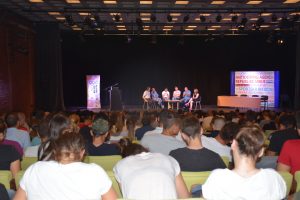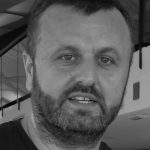
Kultura jedne organizacije / Culture of one organization
 Verujem da će ovaj tekst izazvati debatu,što je neumitno ako želite da započnete razgovor o kulturi, pa još u jednoj nevladinoj organizaciji.
Verujem da će ovaj tekst izazvati debatu,što je neumitno ako želite da započnete razgovor o kulturi, pa još u jednoj nevladinoj organizaciji.
Poslednji kongres medicine sporta koji sam organizovao je verovatno 20. po redu od kada sam počeo da se bavim i tom vrstom edukacije. U početku je bilo dosta lako, jer sam organizovao kardiološke kongrese, nekoliko u saradnji sa Evropskim udruženjem kardiologa (1996 – 2000). Kada kažem lako, pre svega mislim na apsolutnu pomoć farmaceutske industrije, koja ide dotle da sve što smislite možete da sprovedete bez mnogo pregovaranja.
Međutim, 2001. godine prof. Slobodan Živanić me je zamolio da organizujem kongres sportske medicine, što sam i učinio i 2002. godine smo imali 1. kongres medicine sporta. Nije bilo jednostavno, po prvi put sam se susreo sa izostankom podrške sponzora, sem nekih prijateljskih kompanija. Ipak čini mi se da je veći problem je bio neplaćanje kotizacija, jer su iz nepoznatog razloga većina učesnika mislila da ne mora da plati svoje učestvovanje, tačnije salu, knjigu apstrakta, kafu na pauzi, lanč paket i u ono vreme koktel na svečanom otvaranju. Problem je rešen tako što sam ubedio da svi plate, uključujući i prof. Vladimira Jorgu, koji verovatno i danas ne veruje da je platio kotizaciju.
Ako pomislite da je sada drugačije, strašno se varate. I dalje svi misle da su bogom dani i da je organizatoru čast što oni mogu da prisustvuju. Tako na primer, na ovom Kongresu predavači nisu platili kotizaciju, što je možda ispravno, da istovremeno nisu i suorganizatori, što automatski povlači odgovornost, između ostalog i finansijsku. Bilo je tu i mnogih koji su svo ovo vreme rasli sa nama zajedno, ali ipak nisu smatrali da treba da podrže naše napore i finansijski. Da ne bih srozao karakter ovog teksta izostaviću imena, ali mi je bar savest mirna što sam ih spomenuo. Posebna priča je većina doping kontrolora, koji su dali sebi za pravo da rade u sportu, a da se pri tom ne potrude da shvate probleme u sportskoj medicini i samom sportu. Ipak trećina ih je bila prisutna, a neki kao dr Marko Trtica, su toliko ozbiljno shvatili naš poziv, da su uzeli odmor, jer nisu mogli da dobiju slobodne dane. E to je kultura pripadanja jednoj organizaciji i ujedno potvrda prve teze.
Prva teza: Kulturno je da pomogneš organizaciju kojoj pripadaš, uključujući plaćanje članarine, kotizacije i sl., a pre svega je kulturno da učestvuješ na njenim događajima, pa makar te to koštalo i dva dana odmora.
Sledeća teza je nova po vremenu nastanka, jer se ranije podrazumevalo da ako se prijaviš na neki kongres ti i na njemu prisustvuješ. Ne znam kako se to desilo, ali danas jedva da trećina prijavljenih učestvuje u radu kongresa. A da stvar bude još interesantnija i predavači ne ostaju da saslušaju druge, već bi da mogu napustili i svoju sesiju, ako što je učinio biomehanista kičme i posture, Aleksandar Dejanović iz Novog Sada, koji je na poziv prof. Predraga Nemeca, učestvovao na sesiji o treningu. I da ne bih samo njega pomenuo reci ću da su farmaceuti, fizijatri i kardiolozi došli samo na svoju sesiju i otišli, da se sa profesorima fizičke kulture desilo isto, ali uz njihovu opasku da bi bilo lepo da postoji mogućnost češćeg druženja lekara i stručnjaka iz fizičke kulture. Jedina grupa predavača koji nisu bili samo na svojoj sesiji su bile kolege sa sportske medicine iz Kragujevca, uključujući i lidera, prof. Vladmira Jakovljevića. A da je neko od kardiologa ostao na Kongresu mogao je da čuje divan rad dr Lane Andrić iz doma zdravlja Bečej i nauči nešto. I svi ostali su mogli da nauče mnogo, samo da su dali sebi priliku. Suština je onome što ljudi osećaju, kako razmišljaju i u šta veruju. Da parafraziram Aristotela – mi smo ono što mi više radimo. Prosto rečeno kultura je ono kako se ponašamo.
Druga teza: Kulturno je da ostaneš na svojoj sesiji, da saslušaš druge, a posebno je kulturno da učestvuješ u radu Kongresa, pogotovo ako si jedan od predavača i/ili suorganizatora. Nije lepo da slušaš samo sebe.
Ovo poslednje je deo nekulture koja dovodi do toga da većina predavača ne poštuje vreme. već prvog dana dve doktorke su rekle, da će predavati duže, a na moju opasku da je to nemoguće, rekle su da moraju. I bilo bi dobro da su samo one to prekršile, međutim, samo nekolicina se držala vremena, pa smo drugog dana imali kašnjenje u prvoj sesiji od 30 minuta, kome je dodato još 15 minuta u drugoj sesiji, što nije više moglo da se popravi. Naravno da je teško opisati nekome da ako pojedeš pauzu i deo sledeće sesije, onda se sve pomera. A posebno je teško razumeti zašto to ne razume i moderator koji je postavljen da bi čuvao vreme, kulturno predstavio predavače, postavio pitanje, ako nema pitanja iz publike i na kraju sumirao zaključke cele sesije, čak iako se lično ne slaže sa istim. Čini mi se da je suština problema u neiskustvu, sujeti i nepoštovanju nečijeg rada.
Treća teza: Kulturno je poštuješ pravila domaćina, pre svega vreme, ako si već prihvatio da budeš deo događaja, jer time pokazuješ i svoje vrednosti. Civilizacijski je da ne nudiš ad hok rešenja, kada već to nisu uradio kada je trebalo. To je suština kulturne organizacije.
Kultura je u stvari način na koji se nešto radi. Ona je oblikovana različitim podsticajima. Pošto smo mi siromašno društvo, onda podsticaj svakako nije novac, već status, prepoznavanje, napredovanje, mogućnost da se nešto nauči, stvaranje zajedničkih vrednosti. Sve to definiše kulturu jedne organizacije. Još davne 2001. godine kada me je prof. Živanić zamolio da probudim Udruženje za medicinu sporta Srbije shvatio sam da treba pronaći one koji će u želji da nauče nešto iz sportske medicine poštovati gore navedene vrednosti. I prva stvar je bila promena statua gde članovi nisu bili samo lekari sportske medicine, već fizioterapeuti, treneri, instruktori i svi oni stručnjaci koji u svom svakodnevnim radu poštuju principe sportske medicine. Tako smo došli do toga i da na ovom 6 kongresu imamo više trenera i farmaceuta nego lekara sportske medicine, kojih je bilo samo 8 od 94 koliko ih ima na spisku Lekarske komore, ili samo 4 tim doktora u zemlji koja ima oko 100 sportskih saveza. I to je pitanje kulture i znanja. Niko ne može da bude stručnjak u bilo čemu ako ne daje sebi pravo da uči. Ako ne ide na domaće kongrese, a pogotovo ne na strane i svakako ne piše radove, zašto sebi dozvoljava da radi u oblasti sportske medicine.
Četvrta teza: Kulturno je da daš sebi pravo da učiš, prisustvuješ različitim oblicima edukacije, objavljuješ ono što radiš, saslušaš druge i poštuješ vrednosti na kojoj počiva jedna organizacija.
Na kraju nešto što sam pročitao na Internetu. Kulture je imuni sistem jedne organizacije koji treba da spreči pogrešno razmišljanje, pogrešne ljude i pogrešno ponašanje. Kao u organizmu ukoliko se to ne desi dođe do poremećaja i oboljenja. Možda je jednoj sportskoj organizaciji najlakše da to sankcioniše, jer ako iskoristi fer plej i čisti igru kao osnovne principe, lako povuče crtu na čemu treba da počiva.
Peta teza: Kulturno je da želiš da radiš, budeš deo ili pripadaš organizaciji koju voliš i podržavaš, kao što je nekulturno sve suprotno.
♥
I believe that this text will provoke a debate, which is normal if you want to start a dialogue about cultural in one non-governmental organization.
The last sports medicine congress I organized was probably the 20th in a row since I began to deal with this kind of education. At first, it was quite easy, because I mainly organized conferences in cardiology, several in cooperation with the European Association of Cardiology (1996 – 2000). When I say it is easy, I am primarily referring to the absolute support of the pharmaceutical industry, which goes until that you can do everything you want without much negotiation.
However, in 2001, prof. Slobodan Zivanic asked me to organize a sports medicine congress, which I did and in 2002. we had the 1st Congress of Sports Medicine. It was not easy, for the first time I met with the lack of support from sponsors, except some friendly companies. However, it seems to me that the bigger problem was the non-payment of fees, because for the unknown reason most of the participants thought that they should not have to pay their participation, which means an abstract book, a coffee during break, a lunch packet and at that time a cocktail at the opening ceremony. The problem is resolved by convincing that all should pay, including prof. Vladimir Jorga, who probably still does not believe that he paid the registration fee.
If you think it’s different now, you’re terribly wrong. Still, participants still think that organizer is honoured if they are able to attend. For example, at this Congress, the lecturers did not pay the fee, which may be correct, if they are not co-organizers, which automatically takes responsibility, among others, financial. There were also many who are learning together with us all this time, but they did not think they should support our efforts financially. In order, not to ruin the character of this text, I omit the names, but at least my conscience is calm, as I mentioned this. A special story is the majority of doping control officers who have given themselves the right to work in the sport without trying to understand the problems in sports medicine and the sport itself. Still, a third of them were present, and some, like Dr. Marko Trtica, took our call so seriously that he took a vacation since he could not get free days. This is the culture of belonging to one organization and at the same time the confirmation of the first thesis.
The first thesis: It is culturally to help the organization to which you belong, including the payment of membership fees, registration fees, etc. and above all it is culturally to participate in its events, even if it cost you two days of vacation.
The next thesis is new because it was assumed that if you apply for a congress you attend the same. I do not know how this happened, but today, hardly a third of those who are registered participate in the work of the congress. And that thing is even more interesting, since lecturers would like to skip to listen to others, even to leave their own session after they finish talk, as biomehanist of the spine and the posture, Aleksandar Dejanovic from Novi Sad has done. And not only to mention him, I will say that the pharmacists, physiatrists and cardiologists came only to their session and left. The teachers of physical culture do the same thing, but with remark that it would be nice to have the possibility of more frequent meeting of doctors and experts from physical culture. The only group of lecturers who were not only at their session were colleagues from sports medicine from Kragujevac, including the head, prof. Vladmir Jakovljevic. And if one of the cardiologists stayed in the Congress, he could hear the wonderful work of Dr. Lana Andric from the primary health center Bečej and learn something. And everyone else could learn a lot, only to give themselves an opportunity. The essence is what people feel, how they think and what they believe. To paraphrase Aristotle – we are what we do. Quite simply, culture is how we behave.
Second thesis: It is culturally to stay on your session, to listen to others, and it is especially cultural to participate in the work of the Congress, especially if you are one of the lecturers and / or co-organizers. It’s not nice only to listen to yourself.
This is the last thesis leads to the fact that most teachers do not respect the time. On the first day two doctors said they would talk longer, and to my remark that it was impossible, they said they must. And it would be good only that two of them broke it, but only a few presenters respected the time. So, on the second day we had a delay in the first session 30 minutes session, in second was added another 15 minutes, which could no longer be compensate. Of course, it is difficult to describe to someone that if you eat a break and part of the next session, then everything moves wrongly. In particular, it is difficult to understand why this does not understand the moderator who was appointed to keep time, introduce presenters, asked the question, if there was no question from the floor, and eventually summarized the conclusions of the whole session, even if it personally disagrees with it. It seems to me that the essence of the problem is inexperience, vanity and disrespect of one’s work.
Third thesis: It is culturally that you are respecting the rules of the host, the most important is the time. If you have already accepted to be part of the event, since that also shows your values. It is civilized that you do not offer ad hoc solutions, when they did not do it when it was needed. This is the essence of a cultural organization.
Culture is actually the way something is done. It is shaped by various motivations. Since we are a poor society, the stimulus is certainly not money, but status, recognition, advancement, the ability to learn something, creating common values. All this defines the culture of an organization. Back in 2001, when prof. Zivanic asked to wake up the Sports Medicine Association of Serbia, I realized that those who would like to learn something from sports medicine should respect those values. And the first thing I did was to change the Statue where the members were not only doctors of sports medicine, but physiotherapists, trainers, instructors and all those experts who in everyday work respect the principles of sports medicine. So, we have come to this and that at this 6th Congress we have more trainers and pharmacists than doctors of sports medicine, only 8 out of 94 have them on the list of the Serbian Medical Chamber, or only 4 teams of doctors from a country that has about 100 sports associations. And this is a matter of culture and knowledge. No one can be an expert in anything unless he/she gives himself/herself the right to learn. If they do not go to national congresses, and especially not on the international one and certainly do not write papers, why do they allow themselves to work in the field of sports medicine.
Fourth thesis: It is culturally that you give yourself the right to learn, attend various forms of education, publish what you do, listen to others and respect the values on which an organization is based.
In the end, something I read on the Internet. Culture is an immune system of an organization that should prevent misconceptions, wrong people and misconduct. As in the body, if it does not happen there are disorders and problems. Perhaps it is easiest for a sports educational organization to sanction this, because if it uses a fair play and principles of clean game as basic principles, it easily pulls the line which should not be crossed.
Fifth thesis: It is culturally that you want to work, be a part or belong to the organization you love and support, everything else in non-cultural.


